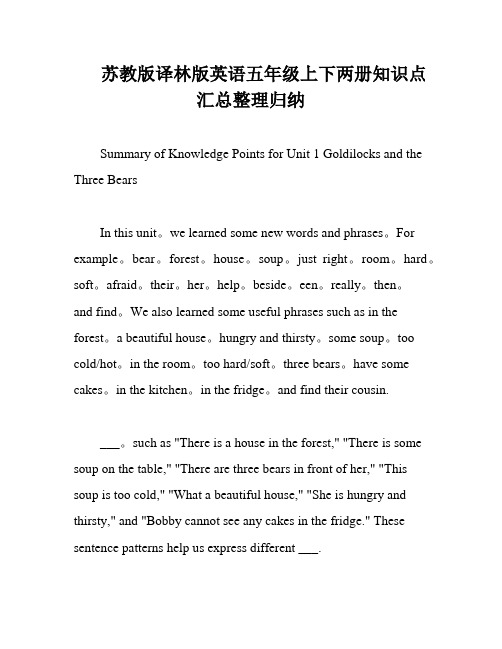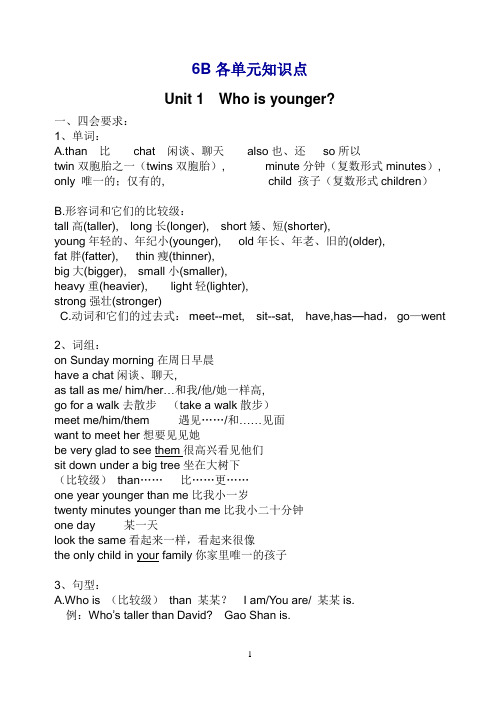苏教译林英语知识点归纳总结
- 格式:doc
- 大小:17.00 KB
- 文档页数:3

big---small this---that fat---thin these---those long---short Mr---Mrs tall---short sit---sta nd happy---sad eat---drink new---old black---white up---dow n on-un der come -- go here --there brother--- sisteruncle ---auntfather---motherboy---girlmorning--- eve ning yes -- no cold寒冷的--hot 炎热的 bad 坏的--good che ap 便宜的 --expe nsive, dear 昂贵的 clea n 干净的 --dirty 肮脏的 clever 聪明的 --foolish 愚蠢的 cold 寒冷的 --hot 炎热的light 轻的-- heavy 重的 right 正确的 --wrong 错误的三、近义词/词组cute---lovelyhow about---what about little---smalltoo---either some---any would like---want ni ce-beautiful many---muchlike ——love hi ——hellodesk —table、反义词/对应词 好的四、 同音词(同音字母) their---there Rr--- are 五、 名词1. 不可数名词2. 名词变复数力卩 es: classes, glasses, buses, dresses; peaches, sandwiches ; potatoes,tomatoes, man goes; foxes, boxes改 y 为 i 加 es : family -amilies, baby-babies (monkeys, toys, boys)a-e : man-men, woman-women, postman-postmen, policeman-policemen , sno wman-sno wme n特殊:child-children , fish-fish, for---four Uu---youmilk , juice , aren't---aunt I --- eye Yy-__ whyBb-bee Cc---seecoffee ,tea, water rice ,bread , fruit, food ‘chocolateAa Ee Ff Hh Ii LlMm Nn Oo Rr Ss Xxclothes 只有复数 1. Do you like …? Yes, I do. / No, I don '. 2. Do you have …? Yes, I do. / No, I don '. 3. How manyyou have? I have …4. Ca n you/he/she …? Yes,l/he/she can. / No, I he/she cat.5. Where is/aremy ….? Your …is/are …6. What would you like? I ' like …,please.7. Ca n I help you? I'd like …,please.8. A nyth ing else?9. How much is it? It 'yua n.10. How much are they? Theyre (They are)…yua n. 11. His/Her …is/are … 八、缩写形式完成形式 he'=he isshe s =she isare isn '二is not aren '二are not don '=do notm ----Iis----单数、不可数 are----复数、you 十、情态动词 can , may , would十二、元音字母 Aa Ee Ii Oo Uu who 谁问人 whose 谁的问---的主人 what 什么冋东西 what time 什么时间 问时间 what colour 什么颜色 问颜色 how …怎么样 问情况how old 多大 问年龄how many 多少 问数量 which 哪一个对定语提问why 为什么 问原因how much 多少(不可数)/ 多少钱---问价钱where 哪里问地方十、be 动词you'd = you would六、 介词 in 在 .... 里面 在……下面七、 句型on 在 .... 上面 beh ind 在 ... 后面at 在……,在……边 beside 在 ... 旁边 n ear 在under 附近it s =it is I 'm=l amwe're =we arethat's=that is what's=what is where's=where is who's=who is let 's=let us they're=they are you 're=you can '二ca n not I 'd=l would 九、疑问词 we'd =we would十三、以元音开头的字母Aa Ee Ff Hh Ii Ll Mm Nn Oo Rr Ss Xx。

苏教版译林版英语五年级上下两册知识点汇总整理归纳Summary of Knowledge Points for Unit 1 Goldilocks and the Three BearsIn this unit。
we learned some new words and phrases。
For example。
bear。
forest。
house。
soup。
just right。
room。
hard。
soft。
afraid。
their。
her。
help。
beside。
een。
really。
then。
and find。
We also learned some useful phrases such as in the forest。
a beautiful house。
hungry and thirsty。
some soup。
too cold/hot。
in the room。
too hard/soft。
three bears。
have some cakes。
in the kitchen。
in the fridge。
and find their cousin.___。
such as "There is a house in the forest," "There is some soup on the table," "There are three bears in front of her," "This soup is too cold," "What a beautiful house," "She is hungry and thirsty," and "Bobby cannot see any cakes in the fridge." These sentence patterns help us express different ___.Finally。

6B各单元知识点Unit 1 Who is younger?一、四会要求:1、单词:A.than 比chat 闲谈、聊天also也、还so所以twin双胞胎之一(twins双胞胎), minute分钟(复数形式minutes), only 唯一的;仅有的, child 孩子(复数形式children)B.形容词和它们的比较级:tall高(taller), long长(longer), short矮、短(shorter),young年轻的、年纪小(younger), old年长、年老、旧的(older),fat胖(fatter), thin瘦(thinner),big大(bigger), small小(smaller),heavy重(heavier), light轻(lighter),strong强壮(stronger)C.动词和它们的过去式:meet--met, sit--sat, have,has—had,go—went2、词组:on Sunday morning在周日早晨have a chat闲谈、聊天,as tall as me/ him/her…和我/他/她一样高,go for a walk去散步(take a walk散步)meet me/him/them 遇见……/和……见面want to meet her想要见见她be very glad to see them很高兴看见他们sit down under a big tree坐在大树下(比较级)than……比……更……one year younger than me比我小一岁twenty minutes younger than me比我小二十分钟one day 某一天look the same看起来一样,看起来很像the only child in your family你家里唯一的孩子3、句型:A.Who is (比较级)than 某某?I am/You are/ 某某is.例:Who’s taller than David? Gao Shan is.B.Whose … is (比较级),某某的or 某某的?某某的is,I think.例:Whose school bag is heavier,yours or mine? Yours is, I think.Whose apples are bigger, Jim’s or his sister’s? His are.C.as (原级) as例:I’m as tall as you.Are you as old asTom? Yes,I am.D.Su Yang’s twenty minutes younger than Su Hai.He is one year younger than me.You’re the only child in your family.Do you have any brothers or sisters?Do you look the same? Yes, we do.二、三会要求:1、单词、词组:centimetre厘米kilogram千克height身高weight体重goalkeeper守门员try again再试一次be a goalkeeper成为一个守门员2、句型:Wha t’s your height?你的身高是多少?How tall are you ?What’s your weight?你的体重是多少?I’ll be the goalkeeper.我将做守门员。

苏教译林版英语三年级下册各单元知识点精讲Unit 1 In class一、词汇Mr 先生please请open开;打开the这个;这些;那个;那些door门sorry对不起close关上;合上;window窗户blackboard黑板book书rubber橡皮parrot鹦鹉in class 在上课Stand up. 起立Sit down.坐下come in 进来don't = do not listen to 听二、句型及语法1.Stand up. 起立其反义短语:sit down2.Liu Tao, please open the door. 刘涛,请打开门。
人名与逗号隔开,故以第一第二人称表达此句为祈使句,无人称和数的变化。
其否定句在句首+don'tPlease don't open the door.【区别】:Liu Tao opens the door.(此句以第三人称开头)【反义词】open close3.I’m sorry. 对不起。
表示道歉的句型,I’m sorry to do sth. 抱歉做某事I’m sorry to be late. 我很抱歉迟到。
e in,Mike. 进来,迈克。
【拓展】come gocome on 加油,过来come after 跟随come back 回来come out 出来come to 来到...5.In class. 在课堂上。
【辨析】:at school 在学校;at home在家;in the classroom 在教室里注意介词的搭配使用。
6.Look at the blackboard, Sam. 萨姆,看黑板。
“look at”意为“看...”,当看某物或某人时,需要介词at。
Look at Betty. 看Betty。
【注】:如look需要单独使用的时候,需要与符号一起使用Look,she is Betty. 看,她是Betty。

Unit 7 Protect the Earth 一、单词(默写):coal 煤炭earth 地球oil 石油paper 纸plastic 塑料wood 木头,木材protect 保护save 节约useful 有用的energy 能源drive 开车,驾驶gate 大门waste 浪费reuse 再利用much 很多most 大部分other 其他的glass 玻璃project 课题poster 海报二、短语(默写):e from = be from从…来,来自2.in many places 在许多地方3.cut down too many trees砍伐太多的树木4.on earth 在地球上e a lot of energy使用大量能源e water to clean tings 用水洗东西e wood to make tables 使用木头做桌子8.waste water 浪费水资源e too much plastic使用太多的塑料10.many other things很多其他东西11.help keep the air clean帮助保持空气清新12.Earth Day地球日e paper bags and glass bottles 使用纸袋子和玻璃瓶14.do a project 做课题15.make a poster 做一张海报16.be bad for 对……有害be good for 对……有益17.put it at the school gate 把它放在学校大门上18.save energy 节约能源19.tell sb. about sth.告诉某人关于某事20.most of the energy大多数能源21.reuse sth. to do sth:reuse a plastic bottle to make a toy 再利用塑料瓶做一个玩具reuse paper to make a box 再利用纸做一个盒子22.let sb. do sth:let me draw some bananas 让我画一些香蕉23.collect some plastic bags 收集一些塑料袋三、句型(默写)1,there be 句型There is not much water. 水资源匮乏。

Unit1Dream homes 一、词汇大集合palace n.皇宫,宫殿Canada n.加拿大country n.国家Japan n.日本mile n.英里UK abbr.(=United Kingdom)英国flat n.公寓,套房area n.面积centre n.<英>中心=<美>centermay v.可以,也许,可能share vt.合用;分享town n.镇,城镇own adj.自己的vt.拥有,所有capital n.首都bathroom n.浴室;舆洗室garden n.花园,果园beach n.海滩thousand num.千grow vt.&vi.种植;生长bedroom n.卧室zero num.零balcony n.阳台million num.百万sea n.海over prep.超过;越过;在…上方,遍及;在…期间hundred num.百square adj.平方的;方形的foot n.(pl.feet)英尺metre n.<英>米,公尺=<美>meterstudy n.书房fridge n.冰箱fork n.叉,餐叉knife n.刀lamp n.灯,台灯shower n.沐浴器;沐浴;阵雨sofa n.沙发video n.录像;视频message n.消息,音信double adj.&n.双(的);两倍(的)invite vt.邀请machine n.机器France n.法国field n.地,田Russia n.俄罗斯stay vi.&n.停留,逗留国家->首都->语言->人Country Capital Language People/People’sJapan Tokyo Japanese Japanese JapaneseThe USA Washington D.C.English American(s)American Britain/The UK London English Englishman/Englishwoman English France Paris French Frenchman/Frenchwoman FrenchThailand(泰国)BangkokRussia(俄罗斯)Moscow Russian Russian(s)RussianChina Beijing Chinese Chinese ChineseAustralia(澳大利亚)Canberra(坎培拉)English Australian(s)Australian Canada(加拿大)Ottawa(渥太华)English/French Canadian(s)Canadian Italy(意大利)Rome(罗马)Italian Italian(s)Italian Germany(德国)Berlin(柏林)German German(s)German词组1 live in a palace住在一个宫殿里2、1,815feel tall1815英尺高3、next to紧邻,在……近旁;仅次于4、in size在大小上5、the capital of……的首都6、be different from与……不同7、enjoy a cup of tea喝杯茶8、be full of满足9、in the centre of在……的中心10、of one’s own属于某人自己的11、on the seventh floor在第八层12、some day将来有一天,总有一天13、share sth with to与某人合用/分享礼物13、take a message传个话,捎个口信14、listen to music in bed在床上听音乐15、call sb back回电话16、my own bed room我自己的卧室17、at the foot of在……脚下18、look out at the beach and the sea向外看海滩和大海19、a football field一个足球场20、invite my friends to watch films with me邀请我的朋友21、more than enough food足够多的食物二、句型大集合1、Would you like to live in a palace,Eddie?艾迪,你想住在宫殿里吗?这里would like是“想,想要”的意思,后面可以加名词或动词或动词不定式。
五年级下册Unit3 Asking the way一.词汇take搭乘station车站walk走;步行bookshop书店sun太阳along沿着,顺着cinema 电影院hospital医院shop商店zoo动物园supermarket超市film电影stop车站full满的,饱的over结束ask the way问路get to 到达get on上车get off下车next to在…旁边ask…for help 向…求助excuse me劳驾;对不起turn right向右转traffic light交通灯on your right在你的右侧turn left向左转二.句型及语法1. Yang Ling wants to visit Su Hai’s new home. 杨玲想要拜访苏海的新家。
want sth. “想要某物”;sth. 一般是名词want to do sth.“想要做某事”;do是动词原形,表达主语想要的动作。
want sb. to do sth.“想要某人做某事”;sb.是want的宾语,是主语要这个宾语做某事。
(1)I want some water. 我想要点水。
(2)I want to drink some water. 我想要喝点水。
(3)I want him to drink some water. 我想他喝点水。
【拓展】:want to do = would like to + 动词原形意为“想要...”Su Hai’s 苏海的通常情况下,名词单数形式(所有格)+ ’s ; 复数形式并以s结尾的名词(所有格)+ ’ 。
如名词复数为特殊形式的单词(所有格)因情况+ ’s。
例:women’s coats;children’s cakes;students’ bags;people’s houses无生命物体的所有格形式为:...of.....the window of classroom 教室的窗户2. How do I get to your home, Su Hai? “苏海,我怎么去你家?”get to… 意为“到达某地”,如地点为home;there;here时,三者均为地点副词,介词to需去掉。
苏教译林版初中英语九年级下册Unit 3单词、课文跟读+知识点梳理Unit 3 词汇表(以下内容仅供参考,如有错漏,请以课本词汇表为准)▼▼▼▼robot [ˈrəʊbɒt] 机器人post [pəʊst] 邮寄explore [ɪks plɔː] 探索;探讨outer space 太空brain [breɪn] 大脑whatever [wɒtˈevə] 任何,一切事物order [ ɔːdə] 点菜,订购,命令,有效安排suit [suːt] 套装smoothly 平整地,顺利地iron [ˈaɪən] 熨烫in general 总的来说;大体上satisfy [ˈsætɪsfaɪ] 满足,使…满意need [niːd] 需要virus [ˈvaɪərəs] 病毒no longer 不再properly [ˈprɒpəli] 正确地,适当地plete [kəmˈpliːt] 完全的,彻底的mess [mes] 乱七八糟,混乱,困境lay [leɪ] 放,搁store [stɔː] 储藏,存储coin [kɔɪn] 硬币bill [bɪl] 账单;钞票private [ˈpraɪvɪt] 私人的paper [ peɪpə] 文件,证明spread [spred] 使散开;扩散wheel [hwiːl] 轮子,车轮pill [pɪl] 药片;药丸unsure 不确定,没把握forgetful [fəˈɡetfʊl] 健忘的stair [steə] 楼梯battery [ˈbætəri] 电池customer [ˈkʌstəmə] 消费者,顾客hold [həʊld] (打电话时)等待,不挂断through [θruː] (电话)接通者put through 给…接通(电话)satisfied 满意的,满足的be satisfied with 对…感到满意first of all 首先quality [ˈkwɒlɪti] 质量up to standard 达到标准pletely 完全地regret [rɪˈɡret]后悔;遗憾product [ˈprɒdʌkt] 成品,成果。
译林新版小学五年级下册知识点整理Unit 1知识点一、单词:because 因为fairy 仙女fit 合适,合身have to 不得不,必须leave…behind留下,丢下mushroom 蘑菇prince 王子understand 明白,理解pick 摘,拾take off 脱下be bad for有害的clothes 衣服let 让put on 穿上before 在…以前try on 试穿late 迟的pick 摘二、词组:at the prince’s house 在王子的房子be sad 伤心go to the party 去聚会don’t have any nice clothes or shoes没有漂亮的衣服或鞋子come back 回来have a good time 过得愉快at the party 在聚会take off 脱下try on 试穿have to go必须走leave…behind留下,丢下in the forest 在深林里under a tree在一棵树下pick a big red mushroom摘一个大红色的蘑菇look so nice 看起来很漂亮are bad for us 对我们有害的三、句型:Why are you so sad ? 你为什么这么伤心?Because I can’t go to the party. 因为我不能去参加聚会。
Why?为什么?Because I don’t have any nice clothes and shoes.因为我没有漂亮的衣服或鞋子。
四、语法:c an’t = can not don’t =do notUnit 2知识点一、单词:far from 离……远near 在……附近by … 乘……bus 公共汽车,大巴士on foot 步行metro 地铁taxi 出租车,的士bike自行车plane 飞机ship轮船train 火车ride 骑车show 给……看basket 篮子city城市二、词组:your new home 你的新家very big 很大far from school 离学校远live on Moon Street 住在月亮街上near City Library在城市图书馆附近come to school 来学校by bus 乘公共汽车on foot 步行by metro 乘地铁by taxi 乘出租车 a taxi driver 一位出租车司机in the park 在公园里can fly 会飞show his bike to sam 展示他的自行车给山姆看too young 太小(年龄)sit in the basket 坐在篮子里三、句型:Where do you live?你住在哪里?I live … 我住在…… I live near/ far from…我住在附近/离远How do you come to school? 你怎样来学校的?I come to school… 我来学校……Unit 3知识点一、单词:along 沿着,顺着ask the way 问路ask…for help 向……求助full 满的,饱的get to 到达next to 在……旁边on your right 在你的右侧。
时态复习一、现在进行时现在进行时:表示正在进行的、发生的动作。
通常在句子中有以下的词:1now, look, listen.;ride—riding;get—getting;2. The students are drawing pictures now.3. Listen! She is singing .4. Look! Mr Li is riding a bike.二、一般现在时一般现在时:表示经常发生的动作。
常与every, always, usually, often, sometimes等表经常的时间状语连用。
注:当主语是第三人称单数时,谓语动词也要用第三人称单数。
动词第三人称单数:A:直接加sB:以ch,sh,s,x结尾的单词加es(washes, watches)C:以辅音字母加y结尾的单词,变y为i加es。
(studies)eg:1. We often play in the playground.2. He gets up at six o‟clock.3. Mike sometimes goes to the park with his sister.4. Ben always has a lot of questions.三、一般过去式一般过去时:表示事情已经发生。
常见时间状语:句子特点:动词用过去式.eg:1. I had an exciting party last weekend.2. They all went to the mountains yesterday morning.3. The pen was on the desk just now.4. I was a student some years ago.四、一般将来时句子结构:be going to ; ,tomo rrowext week.1.No, he ________(do).2._____(mean) ′No smoking‵3. Tom _____(have) a new pen.4. Yang Ling_____(like)_____(go) shopping.5. Ben _____(want) _________(fly) a kite.6. Jim _______________(see) a Beijing opera tomorrow evening.7. Listen, the teacher ____________(come).8. What _____Nancy usually ____(do) on Sundays?9. They___________(fly) kites now.10. My book____________(be) on the desk just now.11. The teacher is__________(give) the ord ers. 12. I ________(have) a hat, he _______(have) a cap. 13. She often ______(wash) clothes at home. 14. Mike___________(swim) now. 15. The teacher and the students _________________(climb) the mountain next week. 16. They are _________(talk) about Ben‟s birthday. 17. I‟d like__________(watch) cartoons. 18. I can ______(sing),but she can‟t. She can _____(dance). 20. A:What does it ______(mean)? It means you shouldn‟t______(smoke) 六年级英语期末检测题1乡镇__________________ 学校_____________________ 班级____________ 姓名____________ 座号__________ …………………密………………………………….封……………………….线…………………………………………………………………………..题次一二三四五六七八九十十一十二总评记分A. 听力部分(30分)一、听录音,选出正确的单词,把答案序号填入括号里。
小学四年级上册Unit3知识点归纳总结
1、基数词:
one 一 two 二 three三 four 四 five 五
six 六 seven 七 eight 八 nine 九 ten 十
eleven 十一 twelve 十二 thirteen 十三 fourteen 十四
fifteen 十五
sixteen十六 seventeen 十七 eighteen 十八 nineteen十九
twenty 二十
sticker(s) 贴纸 box(es) 盒子 table tennis 乒乓球 can 能、会、可以 play 玩
do 做 very 很、非常 sure 当然 many 许多 but 但是
2、单复数变化规则(暂且只学以下三种常规变法)
(1) 一般情况下,直接加-s,如:bag-bags, cat-cats,panda-pandas,
monkey-monkeys,horse-horses
(2) 以s. x. sh. ch结尾,加-es,如:bus-buses, box-boxes, brush-brushes,
watch-watches
(3) 以“辅音字母+y”结尾,变y为i, 再加-es,如:library-libraries,family-families,
cherry-cherries
3、短语
toy cars 玩具汽车 some stickers 一些贴纸 those long rulers那些长
的尺子
in that box 在那个盒子里 in the library 在图书馆里 in the school 在学校里
so lovely 这么可爱/多么可爱 funny and lovely滑稽又可爱 have a look 看一看
look at 看…… Look! 看!瞧! play table tennis 打乒乓球
play basketball打篮球 how many (问)多少 how long 多长时间
over there 在那里
4、句型归纳
(1)问: How many robots do you have 你有多少机器人
答1:I have five robots. 我有五个机器人。(完整回答,数量词直接放在所对应名词
前)
答2:I have five. 我有五个。
答3:Five. 五个。(简单回答,只有一个时可以回答Only one.)
句型“How many +可数名词复数+ do you have”用来问有多少个什么东西。
(2)What do you have 你有什么
I have some stickers. 我有一些贴纸。
(3)Can I have a look 我能看一看吗(委婉询问可否看某样东西的常用表达方式)
Sure/Yes/Here you are. 当然/可以/给你(三种回答方式均可)
(4)Can I have one 我可以拥有一个吗(“可以给我一个吗”的委婉表达)
you are./Yes,you can. 当然,给你/是的,你可以。(可以给对方一个。)
No,you can′t. 不,不可以。(不给对方)
(5)Can you play table tennis 你会打乒乓球吗
No,but I can do this! 不,但我会玩这个。
Can your mother dance 你妈妈会跳舞吗
Yes,she can. 是的,她会。
(6)The cake looks very nice. 这个蛋糕看起来非常漂亮。(单数名词对应动词第三人称
单数)
The cakes look very nice. 这些蛋糕看起来非常漂亮。(复数)
说明:一般现在时中,主语是第三人称单数时,动词也要用第三人称单数的对应形式(一
般词尾加s)
(7)What’s in that box 什么在那个盒子里
Let me have a look. 让我看一看。(Let me see.)
说明:let + 宾格(me我,us我们,him他,her她,them他们)
(8)play + 球类 如:play football 踢足球
Play + the +乐器 如:play the piano 弹钢琴
(9)Are these pineapples 这些是菠萝吗
No,but those are pineapples. 不是,但那些是菠萝。
精心搜集整理,请按实际需求再行修改编辑,因文档各种差异排版需调整字体属性及大小